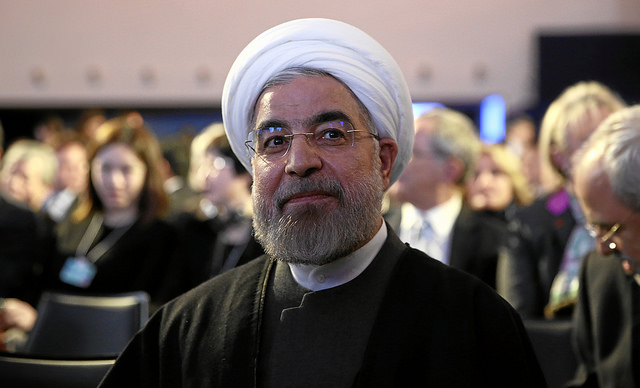Iran–US relations: tough negotiations lie ahead
Posted By Ian Dudgeon on October 26, 2017 @ 11:04

The Iranian government has mounted a robust international campaign rejecting any demands [1] by President Donald Trump for changes to the Joint Comprehensive Plan of Action (JCPOA) and rebutting allegations about Iran’s regional conduct. The result is an impasse between Trump and Iran. However, a deal may still be possible, brokered by the other JCPOA signatories, that leaves the nuclear agreement intact.
Iran’s president Hassan Rouhani responded publicly [2], and very assertively, that the JCPOA isn’t negotiable. The other signatories then quickly and unanimously affirmed their support for it. Rouhani also emphasised that the JCPOA is a multinational agreement and that it isn’t within Trump’s power to unilaterally change it.
Rouhani mounted a strong defence of Iran’s ballistic-missile program, asserting that it’s for regional defence only and ‘not for any sort of nuclear purposes’. Trump had referred to the program as a threat to be addressed and a key part of Iran’s alleged breach of the ‘spirit’ of the JCPOA.
Rouhani also issued three warnings, directly and indirectly, in his speech. The first was that Iran would not yield to any foreign power. Any change to the JCPOA was unacceptable, and would no longer serve Iran’s interests. It would withdraw. Any deal, if there was to be one, had to be separate from the JCPOA.
The second was that Trump’s derogatory descriptions of the Iranian regime generally would make any negotiations that much more difficult. Trump’s language had offended moderates and hardliners alike as nationally insulting, which has restricted Rouhani’s room for domestic manoeuvre compared with the Obama–Kerry era. And Trump’s failure to recognise the Rouhani government’s role during the past four years in laying the basic foundations for Iran–US dialogue and cooperation after a near 40-year freeze has destroyed any carryover of the positives in that bilateral relationship.
The third were the implications of Trump’s targeting of Iran’s Islamic Revolutionary Guard Command (IRGC), including imposing new financial sanctions aimed at disrupting its extensive business enterprises, which are integrated throughout Iran’s economy. In doing so, Trump failed to appreciate the power and importance of the elitist IRGC, not only politically because of its close association with Ayatollah Khamenei, to whom its reports directly, but also militarily because it commands Iran’s ballistic-missile capability. Getting their support, or neutralising their opposition to any deal, won’t be easy.
While the Iranian leadership hasn’t publicly stated that a deal to resolve the JCPOA impasse is possible, some unofficial Iranian sources see the role of the other signatories as the key to brokering any new accord, especially the Europeans. The Iranians recognise that the Europeans face particular challenges, given their traditional close relationship with the US, including, for most, the NATO alliance.
But they believe the Europeans will be willing to push Trump and Congress very hard because of the implications of a no-deal option. However, they also recognise that the 60-day window for recertification, or possible decertification provided by the US’s Iran Nuclear Review Agreement Act, might make striking any deal within that timeframe simply impracticable. A fallback might be that the promise of an acceptable deal will be enough to persuade Trump to recertify, at least for now.
US secretary of state Rex Tillerson, in a CNN interview [3] on 16 October, indicated that some form of ‘secondary agreement’ could be possible, provided it met Trump’s needs for a more ‘comprehensive strategy’ to address US issues with Iran, and Middle East peace and stability more broadly.
Any new deal will have to be a truly face-saving win for Trump, Iran and the other signatories. One line of speculation is whether Trump’s ‘comprehensive strategy’ extends to the creation of some form of new broader arrangement involving all local and other key stakeholders through which to progress regional peace and stability. Given the right terms of reference and incentives, the Iranians could be tempted to accept such an arrangement, provided it is not US-dominated, and especially if it gives them an opportunity to redress allegations about their regional aims and actions, ensures that they’re a respected equal at the table, and enables all security issues to be addressed equally, including Israel–Palestine and the actions of Saudi rivalry. Or a series of more focused agreements might emerge, building up to such an agreement over time.
Such outcomes, including real progress towards a resolution of the Israel–Palestine dispute, could be both Trump’s legacy and the acceptable formula Iran needs to meet its demands. But there are many unknowns and many stakeholders to consider in addition to the US and Iran. Very substantial challenges lie ahead.
Article printed from The Strategist: https://www.aspistrategist.org.au
URL to article: https://www.aspistrategist.org.au/iran-us-relations-tough-negotiations-lie-ahead/
URLs in this post:
[1] demands: https://www.whitehouse.gov/the-press-office/2017/10/13/remarks-president-trump-iran-strategy
[2] responded publicly: http://www.aljazeera.com/news/2017/10/rouhani-hits-trump-nuclear-deal-speech-171013190257102.html
[3] CNN interview: http://edition.cnn.com/2017/10/15/politics/rex-tillerson-iran-nuclear-agreement-cnntv/index.html
Click here to print.